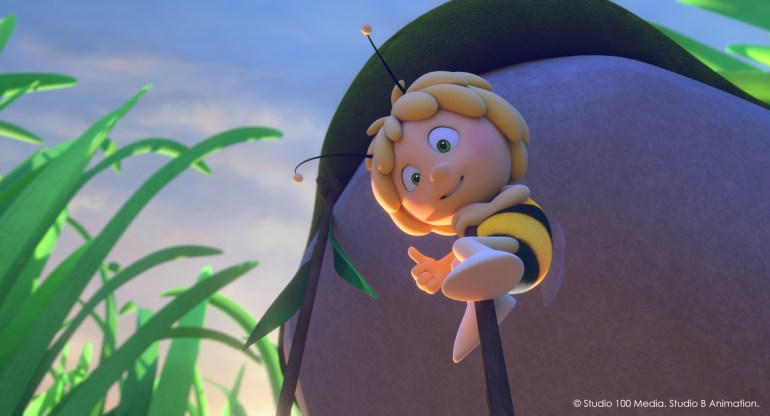‘Maya the Bee: The Honey Games.’
Settling into her elevated role as CEO of content, Studio 100 International, Barbara Stephen is overseeing an increase in the company’s Australian animation business Flying Bark Productions and its US and European units.
“Our strategy is to create content that is driven from each of the home markets and where we think there is an opportunity to expand that into global markets,” says Stephen, who continues as MD of Flying Bark, a post she has held since 2014.
“I see my role as ensuring each production business has a slate that they feel confident will work first and foremost for the local territory.
“The majority of my time will be spent with Flying Bark, which is the biggest animation production business within the animation group, as we expand. I will also work on strategy and planning for the international businesses, so it’s a happy marriage.
“It’s rare to see a global company pick Australia as its leading international business, but it makes sense. I’m delighted we’ve been able to grow the business with the talent we have, many of whom have been here for a long time, and are getting recognised.”
In addition to her Flying Bark role she takes executive management of all development, investment and animation production across Studio 100 Animation (Paris), Studio Isar Animation (Munich) and Little Airplane Productions (New York).
The in-house workforce in Sydney consists of 120 people in the 2D team, rising to around 150, and nearly 100 in the 3D team.
The 3D team is working on 100% Wolf, the movie adapted by Fin Edquist from Jayne Lyon’s book of the same name, and 100% Wolf: Blood Moon Rising, the spin-off series co-produced with the ABC and Germany’s Super RTL.
Also in the pipeline is another edition in the popular Maya the Bee franchise, Maya the Bee: The Golden Orb, produced by Tracey Lenon for Studio B in association with Flying Bark Productions.
“Our production teams are trained to be creative producers so you don’t have tension between what is desired from a quality point of view and what can be met from a scheduling point of view,” she says.
‘Rise of the Teenage Mutant Ninja Turtles.’
The client services’ slate includes the second season of the 2D animated action-comedy Rise of the Teenage Mutant Ninja Turtles for Nickelodeon, and a couple of projects yet to be announced.
Concurrent with Stephen’s promotion, Alexia Gates-Foale, whose production credits include Erky Perky, Zeke’s Pad, The Woodlies, The Adventures of Figaro Pho, Maya the Bee Movie, Blinky Bill: The Movie and the AACTA nominated series The Wild Adventures of Blinky Bill, was upped to head of animation production at Flying Bark.
Stephen is full of praise for Libbie Doherty, the ABC’s recently appointed head of children’s production, observing: “The financing and budgets for independent production are extremely tight. There are only certain projects that are going to work for the ABC. Libbie is doing a great job. She has been on both sides, broadcasting and producing, and she has a lot of faith in the sector.”
She hails the success of Ludo Studio’s Bluey, which has clocked more than 100 million program plays on ABC iview, a record for the platform, as testimony to the desire of children to see and hear their own stories. Not so long ago, she recalls, no 2D animation for pre-schoolers was being commissioned.
Like her colleagues, she rues federal government inaction on reform of local content quotas for broadcasters and the dwindling funding for animation production.
“We have a very skilled animation industry in Australia, which you see at the top level from what Animal Logic and Method Studios are doing,” she says.
“On the TV side we have the capacity and the capability, but you can’t keep teams together and fill the pipeline and it’s difficult to make quality shows without consistent funding.
“There is market failure. The system needs support and more intervention to make sure there is a future for Australian kids content.”



